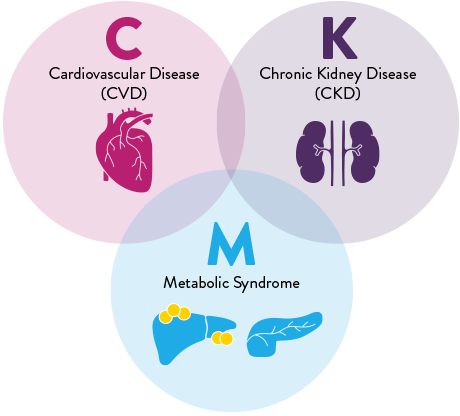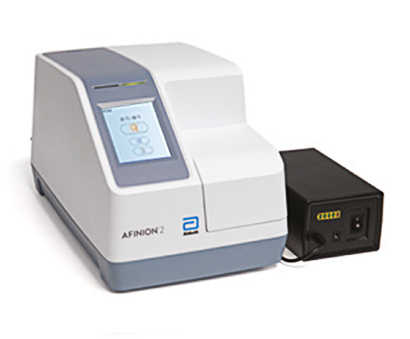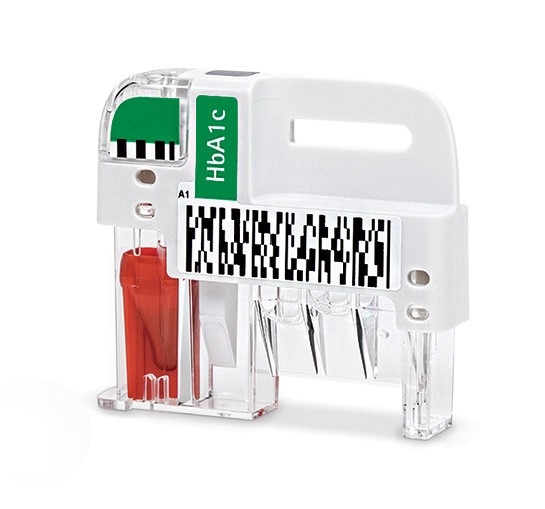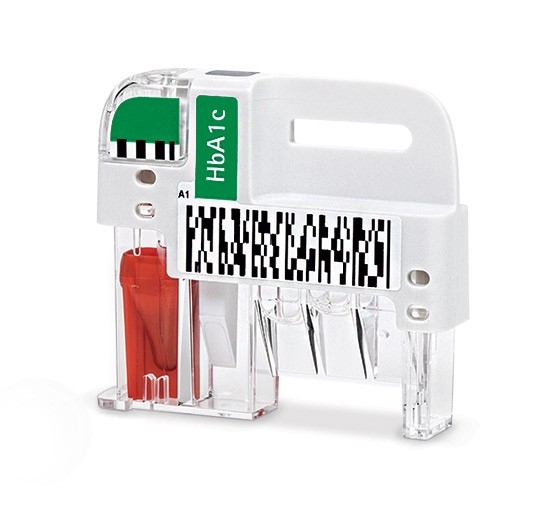global Point Of Care
Chronic kidney disease (CKD) affects approximately 850 million people worldwide. It is the ninth leading cause of death worldwide, and the third fastest-growing cause of death globally, with rising mortality rates. By 2040, CKD is expected to become the fifth leading cause of years of life lost.1,2,3
If left undetected and untreated, CKD can progress to kidney failure, leading to severe complications and premature mortality. CKD is also a critical component of cardiorenal metabolic diseases, including cardiovascular disease and metabolic disorders.3
Updated guidelines recommend broader testing
Patients with diabetes, hypertension, or cardiovascular risk factors should be assessed at least annually.4
Kidney disease can be prevented, and progression to end-stage kidney disease can be delayed with appropriate access to basic diagnostics and early treatment. With point-of-care testing, primary healthcare providers can do just that – in minutes.
Watch this video to learn why early detection and testing are critical to managing chronic kidney disease and preventing complications.
AT-RISK POPULATIONS SHOULD UNDERGO TARGETED TESTING
Recent therapeutic breakthroughs offer new opportunities to prevent or delay kidney disease and mitigate complications such as cardiovascular disease and kidney failure.1 But you can only treat what you know about. Early detection is key.
KDIGO and the International Society of Nephrology (ISN) call for screening of patients with kidney disease risk factors like high blood pressure, diabetes, cardiovascular disease, and a family history of kidney disease, as early treatment can reduce morbidity and mortality rates.5 The American Diabetes Association (ADA) recommends annual screening of people with diabetes for kidney disease.6
Kidney disease screening and risk stratification should consist of a dual assessment of estimated glomerular filtration rate (eGFR) and albuminuria (uACR).5 Identifying renal disease early and monitoring it consistently can make all the difference.
TEST YOUR AT-RISK PATIENT POPULATION TODAY USING AFINION™ ACR.
1 in 10
adults likely have CKD. Of those, 2 out of 3 have not been diagnosed.6
40%
of those diagnosed with diabetes are expected to develop kidney disease.7
90%
of kidney function can be lost before symptoms are experienced.8


1 in 10
adults likely have CKD. Of those, 2 out of 3 have not been diagnosed.6
40%
of those diagnosed with diabetes are expected to develop kidney disease.7
90%
of kidney function can be lost before symptoms are experienced.8


CKM: THE LINK BETWEEN HEART, KIDNEY,
AND METABOLIC HEALTH
CKM refers to Cardiovascular-Kidney-Metabolic syndrome, a condition characterized by interconnected issues like heart disease, kidney disease, type 2 diabetes, and obesity, which the American Heart Association (AHA) has identified as a specific health condition.9
“1 in 3 US adults have risk factors that contribute to Cardiovascular-Kidney-Metabolic (CKM) Syndrome”10
This definition helps identify individuals at high risk for CKM syndrome-related morbidity and mortality, enabling the initiation of preventive strategies before end-organ damage occurs. It also lays the groundwork for outlining the stages of CKM syndrome, identifying evidence-based best practices for its clinical management, and developing tools to screen and categorize individuals by risk for adverse outcomes.
CKM syndrome includes individuals:
At risk for cardiovascular disease (CVD) due to metabolic risk factors, chronic kidney disease (CKD), or both.
With existing CVD potentially related to or complicated by these factors.
The increased likelihood of CKM syndrome and its adverse outcomes is further influenced by unfavorable conditions for lifestyle and self-care resulting from policies, economics, and the environment. This comprehensive approach enables the timely initiation of preventive and treatment strategies.

CKM: THE LINK BETWEEN HEART, KIDNEY, AND METABOLIC HEALTH
CKM refers to Cardiovascular-Kidney-Metabolic syndrome, a condition characterized by interconnected issues like heart disease, kidney disease, type 2 diabetes, and obesity, which the American Heart Association (AHA) has identified as a specific health condition.9
“1 in 3 US adults have risk factors that contribute to Cardiovascular-Kidney-Metabolic (CKM) Syndrome”10
This definition helps identify individuals at high risk for CKM syndrome-related morbidity and mortality, enabling the initiation of preventive strategies before end-organ damage occurs. It also lays the groundwork for outlining the stages of CKM syndrome, identifying evidence-based best practices for its clinical management, and developing tools to screen and categorize individuals by risk for adverse outcomes.
CKM syndrome includes individuals:
At risk for cardiovascular disease (CVD) due to metabolic risk factors, chronic kidney disease (CKD), or both.
With existing CVD potentially related to or complicated by these factors.
The increased likelihood of CKM syndrome and its adverse outcomes is further influenced by unfavorable conditions for lifestyle and self-care resulting from policies, economics, and the environment. This comprehensive approach enables the timely initiation of preventive and treatment strategies.

RAPID DIAGNOSTICS CAN HELP WITH EARLY DETECTION of KIDNEY DISEASE
Rapid point-of-care testing such as Afinion™ ACR assay enable healthcare providers to detect and manage the onset of kidney conditions. The earliest sign of kidney disease is increased excretion of albumin in urine (albuminuria). ACR is the recommended method by KDIGO, ISN and ADA to determine albuminuria. The KDIGO CKD guidelines3 highlight the advantages of using point-of-care testing for creatinine and urine albumin measurement (Recommendation 1.4.1).5-8
By combining immediate treatment with the necessary lifestyle changes - such as maintaining blood glucose, blood pressure and cholesterol levels - many people with diabetes are able to delay the onset of kidney disease complications – or prevent them altogether.11
BENEFITS OF AFINION™ ACR TESTING
Screen for kidney disease
at the point of care
Highly accurate results for albumin, creatinine and albumin-creatinine ratio (acr)
Rapid test results in approximately 5 minutes
3.5 μl random/spot urine sample
Quantitative results
No sample preparation
No manual calibration
required
Quality control and operator lockout



AFINION™ 2 SYSTEM
Immediate results mean immediate advice.
People with diabetes and hypertension are at a significantly higher risk of developing kidney damage.11 Identifying and monitoring renal disease in patients with diabetes and hypertension can make all the difference — and Abbott makes it fast and easy with a compact rapid, multi-assay analyzer that provides valuable near patient testing at the point-of-care.
AFINION™ ACR
Accurate results in approximately 5 minutes.
Part of a multi-assay system, Afinion™ ACR is an in vitro diagnostic test for the quantitative determination of albumin, creatinine and albumin-creatinine ratio in human urine. Measuring ACR is crucial in patients who have chronic conditions, such as diabetes and hypertension, as it serves as a predictive marker for early detection kidney disease.12, 13
Afinion™ Hba1c
Short assay time in approximately 3 minutes.
Afinion™ HbA1c gives you reliable high-quality results conveniently available when and where you need them. This test is used for quantitative determination of glycated hemoglobin (HbA1c) in human whole blood. It also provides the immediate test results you need for improved diabetic control, better patient outcomes, and enhanced clinic efficiencies.

The silent kidneys: rapid albuminuria testing to combat kidney disease
The International Diabetes Federation projects a global diabetes incidence of ~643 million by 2030. Diabetic kidney disease (DKD) occurs in up to 40% of patients with diabetes.
References
- Francis, A., Harhay, M. N., Ong, A. C. M., et at. (2024). Chronic kidney disease and the global public health agenda: an international consensus. Nature Reviews Nephrology. https://doi.org/10.1038/s41581-024-00820-6
- World Health Organization. (2024, August 7). The top 10 causes of death. Retrieved from https://www.who.int/news-room/fact-sheets/detail/the-top-10-causes-of-death
- Marassi, M., & Fadini, G. P. (2023). The cardio-renal-metabolic connection: A review of the evidence. Cardiovascular Diabetology, 22(1), Article 195. https://cardiab.biomedcentral.com/articles/10.1186/s12933-023-01937-x
- KDIGO CKD Work Group. KDIGO 2024 clinical practice guideline for the evaluation and management of chronic kidney disease. Kidney Int. 2024;105(4S): S117-S314. doi:10.1016/j.kint.2023.10.018. https://www.kidney-international.org/article/S0085-2538(23)00766-4/fulltext
- American Diabetes Association. Standards of medical care in diabetes – 2025. https://diabetesjournals.org/care/article/48/Supplement_1/S6/157564/Summary-of-Revisions-Standards-of-Care-in-Diabetes
- Sundström J, Bodegard J, Bollmann A et al. CaReMe CKD study: Prevalence, outcomes, and cost of CKD in a contemporary population of 2.4 million patients from 11 countries. https://pubmed.ncbi.nlm.nih.gov/36090671/
- Alicic, R. Z., Rooney, M. T., & Tuttle, K. R. (2017). Diabetic Kidney Disease: Challenges, Progress, and Possibilities. National Center for Biotechnology Information. https://pmc.ncbi.nlm.nih.gov/articles/PMC5718284/
- The International Society of Nephrology (ISN). Chronic Kidney Disease (2025). https://www.worldkidneyday.org/about-kidney-health/
- Ndumele, Chiadi E., et al. (2023) Cardiovascular-Kidney-Metabolic Health: A Presidential Advisory From the American Heart Association. AHA/ASA Journals https://www.ahajournals.org/doi/pdf/10.1161/CIR.0000000000001184
- American Heart Association. (n.d.). Cardiovascular-kidney-metabolic health. https://www.heart.org/en/professional/cardiovascular-kidney-metabolic-health
- National Institute of Diabetes and Digestive and Kidney Diseases. (n.d.). Diabetic kidney disease. https://www.niddk.nih.gov/health-information/diabetes/overview/preventing-problems/diabetic-kidney-diseas
- Janssen, W. M.T. et al., Low Levels of Urinary Albumin Excretion are Associated with cardiovascular Risk Factors in the General Population. Clin Chem Lab Med 2000; 38(11):1107-2000. https://pubmed.ncbi.nlm.nih.gov/11156337/
- Bloomgarden Z.T., Nephropathy and retinopathy. American Association Annual meeting, 1998. https://diabetesjournals.org/care/article/22/4/640/19128/American-Diabetes-Association-Annual-Meeting-1998











